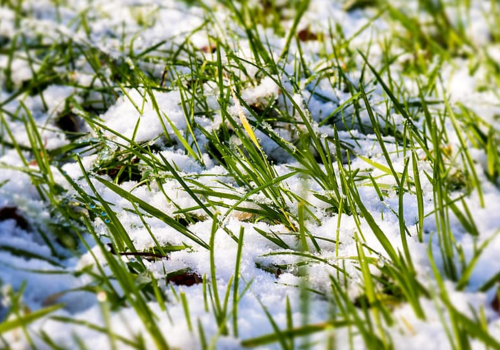
The winter weather in the UK can wreak havoc on your lawn. It can leave you with grass that turns yellow, becomes patchy or dies back. But that doesn’t mean you can’t start to make preparations for new growth during the winter months!
Perhaps you have winter lawn damage that needs repair. So how do you get back to that lush, full lawn you so deeply adored during the summer? Is it possible to repair winter damage by putting down grass seed? Short answer… yes, absolutely!
Here we answer a few of the questions you might have about sowing grass seed in winter...
How cold is too cold for grass seed?
If soil temperature drops below 9 degrees, it can get too cold for regular grass seed to grow. The ideal soil temperature for grass seed germination is 9-12 degrees and just like any seed, grass seed needs the right conditions, with warmth and moisture the key to germination.
However, the great thing is, some grass seeds can grow below this, and our specially formulated Winter Green Grass Seed contains high-quality tetraploid perennial ryegrass that can germinate in soil temperatures as low as just 5 degrees. Choosing a suitable grass seed that can withstand winter temperatures can be the difference between successful, healthy growth and a more lacklustre result. From the middle of February onwards, soil temperatures are generally warm enough to choose from our full range of lawn seed.
Can I sow grass seed in the rain?
Whilst you can sow grass seed after a period of heavy rain, too much moisture may also hamper growth. If your soil drains well, grass seed will have a better chance of germination.
TOP TIP: You can give your grass seed a helping hand by adding topsoil if the ground is very wet, and by aerating your lawn. Aeration is the process of adding holes with a fork or aeration machine, this will loosen compact soil and aid drainage.
What is the best time to reseed my lawn?
The ideal time to reseed your lawn is between mid-February and October, but Winter Green Grass Seed extends the season whilst ever the soil temperature is over 5 degrees. During the winter months, temperature and moisture levels are not at optimal levels for lawn seed germination, but this isn’t always viable and reseeding in winter is still very much possible with a bit of know-how and the right type of seed.
Dormant Seeding
Earlier we discussed that soil temperature below 9 degrees was too cold for most grass seed to grow (except Winter Green!). However, it is still possible to plant in very cold weather too. This is known as dormant seeding.
Dormant seeding is when seed is sown during extremely cold weather, and it stays in a dormant state until the conditions are right for germination. You might choose to do this if you prefer not to wait for the ground to thaw sufficiently for planting in spring. Doing it this way will mean the job is already done and you’ll be ahead of the game when the warmer weather returns.
Can new grass seed survive a frost, freezing temperatures and snow?
Yes! A snowfall after you’ve planted grass seeds can actually be beneficial. It helps create a protective layer over the seeds and keeps them dormant. What can cause issues is a warm spell in winter, this can start the germination process and the new growth can struggle to cope when the temperature lowers again.
This is another reason why it’s important to choose a suitable grass seed that is not only resilient to winter, but whose seedlings will also grow big and strong without complaining it’s too cold.
Planting Grass Seed in Cold Weather
So, as we’ve established, you can indeed sow grass seed in the colder months. If you’ve decided that sowing grass seed in winter works for you, here’s how to go about it for the best results:
- Preparation - Prepare your lawn or soil for grass seed by raking and levelling just like you would at other times of year. Check our full guide to growing a great lawn using grass seed for more details. If the ground is excessively wet, add a layer of topsoil and aerate thoroughly.
- Choose the right grass seed - Certain grass seeds are more suited to winter sowing than others. As we mentioned before, we’d recommend our BS Winter Green Grass Seed containing high-quality and robust grass cultivars, but choose from our full range of lawn seed from mid-February onwards.
- Sowing - Sow evenly and make sure the seed makes good contact with the soil. You can do this by rolling or treading the grass seeds in once it has been spread.
- Watering - If the ground isn’t already wet, water the area thoroughly. Winter weather should keep the soil moist so further watering will probably not be necessary.
- Wait - Sit back, relax and enjoy watching your lawn return to its former glory!
Whilst winter might not be the ideal time as far as sowing grass seed goes, you can certainly lay the groundwork. Put in the effort during winter and when the temperature rises, your grass seed will be ready to grow into the lush lawn you were hoping for!
---------------------------
Have a question about sowing grass seed in winter or want to know which grass seed to use? Either check out our grass seed section to find a lawn seed suitable for cold weather, or get in touch with our friendly experts who'll be happy to help.
